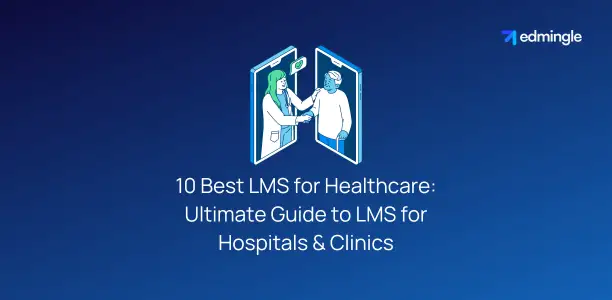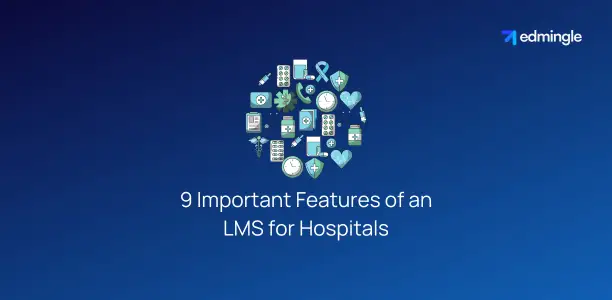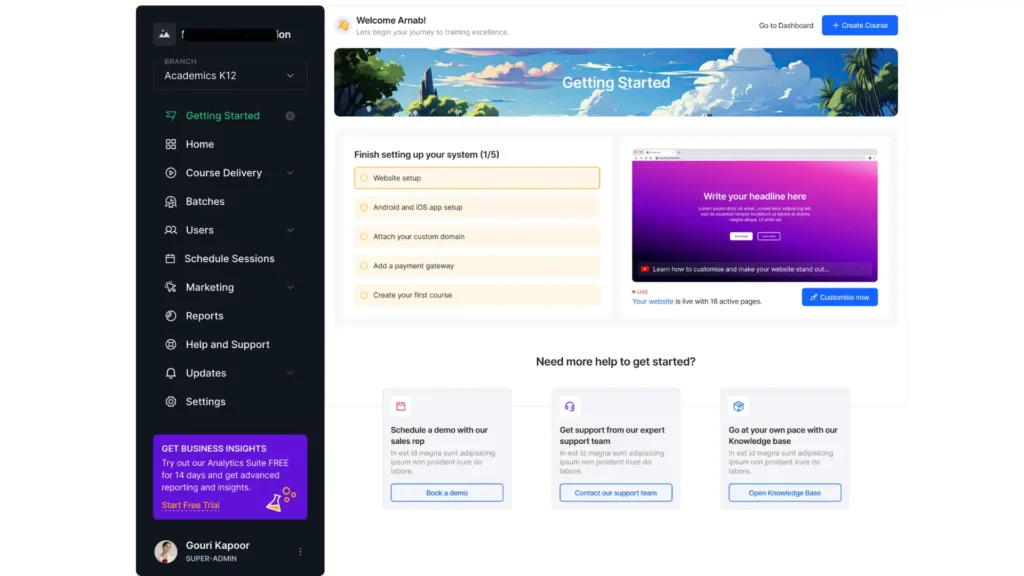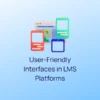
Often termed as HLMS (healthcare learning management system). An LMS for healthcare is a specialized digital platform tailored to meet the unique training & educational needs of the medical sector.
It facilitates the delivery, tracking and management of medical training content. While ensuring that the healthcare workforce stays updated with the latest medical practices, procedures and regulations.
Offering targeted features like compliance training & tracking, hands-on simulations & modules on patient care. These are indispensable tools for hospitals, clinics and other medical organizations.
In this complete guide, we’ll explore everything you need to know about healthcare LMSs. With their benefits, features & the 10 best platforms.
5 Major Benefits of an LMS for Healthcare
Below we highlight the major benefits an HLMS brings for medical care institutions.
1.Standardized Training with Continuous Professional Development
Centralizes and standardizes training materials, ensuring consistent education across the board. While offering a platform for ongoing learning, allowing professionals to stay updated.
2.Regulatory Compliance Management
Facilitates training on & adherence to healthcare regulations. Thus, ensuring that institutions meet necessary standards and avoid potential legal pitfalls.
3.Cost Savings with Flexibility in Learning
Reduces your operational cost by eliminating the need for physical training materials, venues and on-site trainers. While providing convenience, catering to busy schedules of medical care professionals.
4.Skill Assessments for Enhanced Patient Care
Features like quizzes, simulations and feedback mechanisms help in evaluating & improving the proficiency of staff. Since healthcare professionals are equipped with the latest knowledge & skills, it improves patient outcomes.
5.Scalability & Reduced Administrative Burden
Can easily be scaled and hence is suitable for both small clinics and large hospital chains. Automates many training-related administrative tasks. Thus, freeing up resources for other critical functions.
In short, an HLMS not only enhances the training experience. But also plays a pivotal role in improving the overall quality of medical services.
9 Important Features of an HLMS

An LMS tailored for healthcare often comes with specialized features to cater to the unique needs of the sector. Here are some key features of an LMS for medical care:
- Regulatory Compliance Modules: Pre-built courses and tracking mechanisms. To ensure adherence to healthcare regulations and standards.
- Skill Assessments & Quizzes: Tools to evaluate the proficiency of healthcare workers. In various medical associations, procedures and knowledge gap areas.
- Simulation-Based Training: Offers virtual hands-on training experiences. Especially useful for surgical procedures and equipment usage.
- Certification & Recertification: Automates the process of issuing & renewing certificates for completed courses & training.
- Real-time Tracking & Reporting: User management, tracking progress, completion rates and performance metrics is crucial. Thus, providing insights into training effectiveness.
- Mobile Learning: Enables access to training materials on-the-go. Catering to the busy schedules of healthcare professionals.
- Collaborative Tools: Features like discussion forums, peer reviews and group projects to foster social learning.
- Secure Data Storage: Ensures that sensitive data & patient information are stored securely.
- Integration Capabilities: Seamlessly integrates with other software systems like HRMS or patient management systems.
By incorporating these features, an LMS for Healthcare becomes a comprehensive tool. That addresses the multifaceted training and development needs of the medical sector.
Explore about the best training tracking software.
10 Best LMS for Healthcare in 2025
The landscape of healthcare LMSs is vast. And checking out available options can be challenging. But fret not! We’ve done the heavy lifting for you. Here’s a curated list of the top 10 healthcare LMS platforms in 2025. No matter what your use case is, there’s something here for everyone.
1.Edmingle

Edmingle offers a robust SaaS LMS platform that can be tailored to the specific needs of healthcare institutions. A cloud-based learning management system, it is a rapidly growing and highly commended solution.
Its scalability & flexibility make it suitable for specialized medical training and compliance modules. With a wide range of robust features & exceptional customer support and service, it is a highly reliable offering in the LMS landscape.
2.TalentLMS
TalentLMS is a versatile platform for healthcare. Its strengths lie in easy content integration, certification management and compliance tracking.
3.Docebo
Docebo’s LMS, with its AI-driven capabilities, allows for adaptive learning paths. Thus, ensuring medical professionals receive training tailored to their roles and expertise levels.
4.Absorb LMS
Absorb LMS’s intuitive design, mobile device support and automated reporting features. Cater to the dynamic needs of the medical field.
5.Tovuti LMS
Tovuti offers interactive content creation tools. Its suitable for providing hands-on simulations and complex procedure demonstrations.
6.iSpring Learn
iSpring Learn is a dynamic LMS tailored to meet the specific needs of healthcare organizations. It stands out for its ease of use and seamless integrations.
7.Moodle
Moodle, an open-source LMS, offers unparalleled flexibility and customization options. Hence, making it a popular choice for healthcare education and training.
Read about how Edmingle is better vs. an open-source LMS.
8.Litmos
Litmos is renowned for its scalability & user-friendly interface. It excels in delivering targeted training programs, compliance courses and skill development modules.
9.360Learning
360Learning stands out for promoting a collaborative learning environment. One where healthcare professionals can share knowledge, expertise and best practices.
10.Canvas LMS
Canvas LMS is celebrated for its intuitive design and comprehensive suite of features. Tailored to the needs of educational institutions, including those focusing on healthcare.
Each of these LMS platforms offers unique features and benefits suited to the healthcare sector. And selecting the right one requires a careful assessment of specific needs & goals.
Choosing an HLMS is a significant decision. One that impacts how effectively a healthcare organization can train its employees, comply with regulations and ultimately, deliver high-quality patient care.
Check our blog on best hospitality LMS software.
Summary of Healthcare Learning Management Systems
The landscape of healthcare is rapidly evolving. Even more with the technological advancements. You can see this as a symbiotic relationship that supports each other.
In such a scenario, for better trained healthcare professionals, the role of an LMS for healthcare becomes not just beneficial but essential.
It’s clear that an HLMS is not merely a tool for training. But a pivotal element in enhancing the quality of patient care and ensuring regulatory compliance.
FAQs around Healthcare LMS [HLMS]
1.How much do Healthcare LMSs cost?
The cost of an HLMS varies with its features, scalability and the vendor. LMS Pricing can range from free to several thousands of dollars annually. It’s essential to request a quote from vendors based on your specific requirements.
2.What differentiates an HLMS from a general LMS?
While a general LMS provides broad training solutions. An HLMS offers modules on clinical procedures, patient care standards, regulatory compliance and other topics pertinent to the healthcare industry.
3.What effect can an LMS have on the clinical/healthcare industry?
An LMS can have a significant impact on the clinical market. By ensuring that medical professionals are well-trained & updated with the latest clinical practices. This can lead to improved patient outcomes, reduced medical errors and enhanced operational efficiency in clinical settings.





Leave a Reply